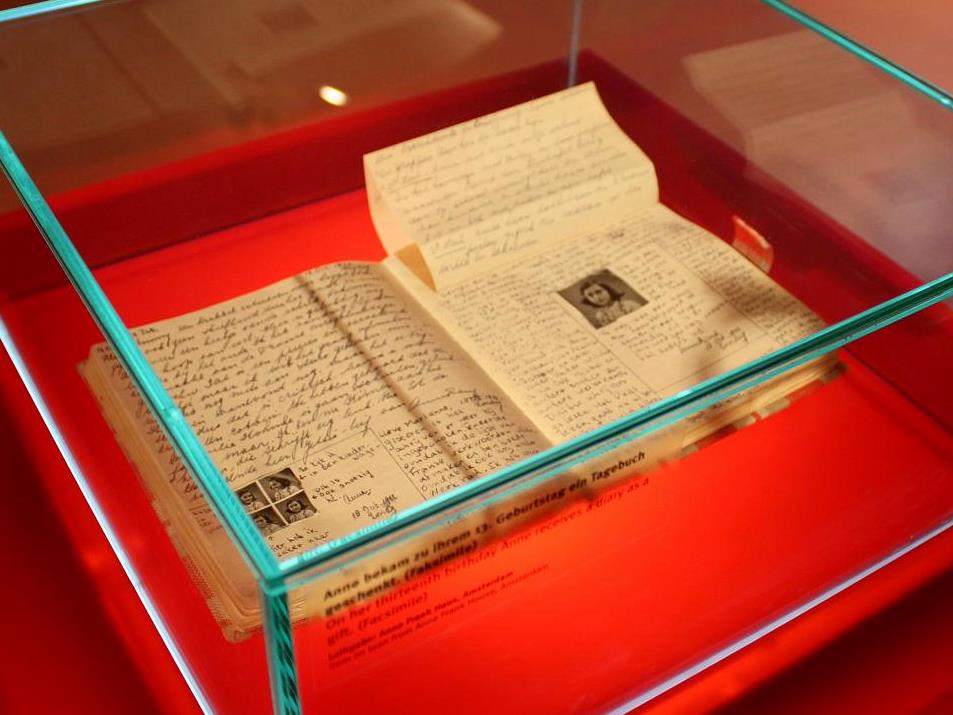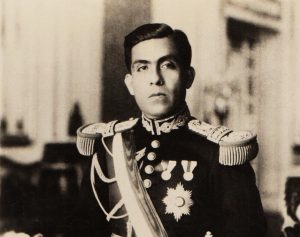Winner of the Fall 2018 StMU History Media Award for
Best Article in the Category of “World History”
Parents’ love for their children is unlike any other. It is something I think most of us often take for granted due to the fact that it is something we just cannot understand until we experience it ourselves. Our parents go to great lengths to ensure not only that we have everything we need, but that we are happy, safe, comfortable, and accomplished. The relationship between a father and his daughter, specifically, is one that in most cases is extremely strong and unlike any other. A father is the first boy in a girl’s life and he is there every step of the way. Fathers usually embody warmth and safety, and many even say that girls subconsciously look for significant others that remind them of their father. This case was no different for Otto Frank and his daughter Anne. She was always “daddy’s little girl.” Otto loved her, as well as the rest of his family, as deeply as anyone could ever ask of a father. He worked hard, always providing for them, and made every sacrifice necessary to keep his family from harm in such a terrifying time. Sometimes though, bad things happen to good people. When his family slipped through his fingers and his world shattered, Otto’s love never wavered. He took his grieving and turned it in to something beautiful. He was an outstanding father until the day he died, even if his fatherhood was slightly untraditional.

Anne Frank always wanted to be a writer, and her father was, of course, her biggest supporter. So, it was no surprise that for her thirteenth birthday, he gifted Anne a brand new, red-checkered journal that she would name “Kitty.”1 Anne grew up during a difficult time in our world: Nazi Germany. In 1933, when Hitler became Chancellor of Germany, the family, being Jewish, decided to relocate to Holland.2 For a while, life in Holland carried on as normal. But, in 1940, Anne’s sister Margot got a call from a Nazi soldier that scared the entire family.3 Since the Frank family was Jewish, they had to live out the war with great caution as well as in great fear. Almost immediately after the phone call from the soldier, Otto Frank, being the caretaker that he was, found an annex in his office building for his family to hide in, in attempts to avoid Nazi capture. Even in hiding, Anne continued to use her journal. In fact, in hiding is where she got the most use out of it. She wrote about everything that happened in the annex, from random events that occurred throughout the day to her own very personal thoughts. That diary displayed Anne in her truest form. Sadly, the life in the annex that they had become accustomed to came to a screeching halt. On August 4, 1944, Otto’s worst nightmare had come true; after over two years in the annex, the entire Frank family was captured by the Nazis, split up, and sent to various concentration camps.4 Otto Frank was left feeling like he had failed. They did not know if they would ever see each other again, or even if they would make it out alive.
When the war ended, the Frank family was devastatingly reduced to one member: Otto Frank. When he heard the news that he would never see the rest of his family again, Otto was devastated. As time passed, the broken-hearted father finally found it in him to return to the annex, where he met with Miep Gies. Miep was one of the family friends who had helped ensure the Franks were well fed and surviving as best they could while in the annex. She presented Otto with his daughter’s diary, which she had carefully saved in the bottom drawer of her desk in hopes of the girl’s return.5 Before they had been captured, every night Anne had left her diary under the protection of her father and placed it by his bed in a briefcase. She asked him never to look into it, and Otto never dared go against his beloved daughter’s wishes. When the diary had come back into his possession, he was torn. Knowing Anne wanted nothing more than to be a published writer, Otto was faced with a difficult decision. Reading the diary meant going against her wishes. Leaving it untouched not only meant the loss of her legacy, but also the loss of any chance at making Anne’s dreams of becoming a writer come true.

Otto decided to read the diary. The notion of being able to fulfill his daughter’s dreams and ensure her legacy was enough to get him to break out of his comfort zone. He believed in his daughter and her writing skills and just knew he could make something of the diary. However, it seemed that reading the diary almost put him in more of a debacle. “It took me a very long time to read it,” Otto said, “and I must say I was very much surprised of what deep thoughts Anne had.”6 Not only was he not sure what he should do next with the book, but he was now unsure if he really knew who his daughter was. “Her seriousness, especially her self-criticism; it was quite a different Anne than I had known as my daughter.”7 The diary was personal, and at times even taboo. She wrote about going through puberty, her shortcomings as a person as well as her sins. She, however, tried to keep a light within her bleak words as she insisted on wanting to be happy despite what was going on in her life.8 The Franks shared the bunker with the Van Pels family. The Van Pels had a son, Peter, who was not too far from Anne’s age. Understandably, considering her age as well as enclosed living space, Anne developed feelings for Peter, which she, of course, documented in detail within her diary.9 Otto was still at war with himself. He was worried about what people might think of his family if they read the truths Anne spoke. Could he let the world see his daughter so vulnerably? Could he withstand the responses that would surely come out in publishing the diary? Was he making the decision about him, rather than Anne?
Selflessly, Otto put any personal feelings he had aside. He loved his daughter and missed her dearly. He wanted her dreams to come true even if she would not be there to see it. Out of love, he decided to go forth and publish the diary. Otto spent long hours typing up the diary and sent the first copy to his mother, and the next few to close family friends. As word of the diary got out, publishers got hungry and offered Otto many opportunities to make it into a professionally done book. When he finally took up the offers of one publisher, the first version of the diary was published. It was titled “Het Achterhuis,” or “Secret Annex,” and excluded almost 30% of her the writings from her diary.10 This decision was meant to keep some of her privacy, as well as the family’s privacy, protected. The director of the publishing company felt that Anne spoke “too freely” about her sexuality and pushed to get rid of several passages.11 Either way, it was out in the world to be read by the masses and Anne’s dream of becoming published had finally been fulfilled. It was bittersweet for Otto, seeing the amazing success his daughter had become, but not being able to see her.

As years went on, the diary was published in many different versions in many different languages all over the world. It has had one of the most profound and lasting impacts of any book in our culture. In seventy years, the book has been translated into over seventy languages, making it one of the most translated books in the world.12 Otto didn’t stop there. For him, Anne’s legacy reaching to the world meant everything to him. He worked tirelessly on new versions of the book. After its publication, it became critically acclaimed by many influential people, such as Nelson Mandela. On top of that, there have been numerous film adaptions of the book since. In 1963, Otto founded the Anne Frank Fond (a foundation) in memory of his beloved daughter. The foundation’s one job is to spread Anne Frank’s word. It holds all copyrights and works to keep her life on paper safe.13 He took the great devotion he had for Anne and fathered her legacy from the ground up. He found a way to be a father to Anne in the physical world despite the fact she had left it.
Otto Frank was a man overflowing with love and support for his family. He went above and beyond to provide for them and keep them under his protection for as long as he could. No words can even begin to explain the pain of losing a child, much less two, along with a wife, and all due to the same reason at the same time. Yet, Otto pushed through all that hurt and turned it in to something beautiful. He gave back to the world even when it had taken everything from him. He constantly relived the life of his daughter, despite how undoubtedly hard it was, in assurance that she would become everything she was meant to be and more. A father’s love is indescribable, and Otto Frank was the perfect embodiment of the great lengths it will go to please its children.
- Anne Frank Stichting, “The History of the Diary,” Anne Frank House, April 19, 2010, http://diary.annefrank.org/the-history-of-the-diary/. ↵
- Salem Press Biographical Encyclopedia, 2013, s.v., “Anne Frank,” by Nancy D. Kersell. ↵
- Encyclopedia of Women’s Autobiography, 2005, s.v. “The Diary of a Young Girl,” by Gary Kerley. ↵
- Francine Prose, Anne Frank: the book, the life, the afterlife (New York: Harper Perennial, 2010), 63. ↵
- Francine Prose, Anne Frank: the book, the life, the afterlife (New York: Harper Perennial, 2010), 71. ↵
- The Legacy of Anne Frank, The Eternal Light (1967, the Jewish Theological Seminary of America and NBC), television program. ↵
- The Legacy of Anne Frank, The Eternal Light (1967, the Jewish Theological Seminary of America and NBC), television program. ↵
- Encyclopedia of Women’s Autobiography, 2005, s.v., “The Diary of a Young Girl,” by Gary Kerley. ↵
- Funk & Wagnalls New World Encyclopedia, 2017, s.v. “Frank, Anne.” ↵
- Encyclopedia of Women’s Autobiography, 2005, s.v., “The Diary of a Young Girl,” by Gary Kerley. ↵
- Anne Frank Stichting, “The Story of Anne Frank: Anne Frank’s Diary Is Published,” Anne Frank House, April 19, 2010, http://web.annefrank.org/en/Anne-Frank/Publication-of-the-diary/Anne-Franks-diary-is-published/. ↵
- Anne Frank Stichting, “The History of the diary,” Anne Frank House, April 19, 2010, http://diary.annefrank.org/the-history-of-the-diary/. ↵
- “Work of the Anne Frank Fonds,” Anne Frank Fonds, http://www.annefrank.ch/work-and-purpose.html. ↵



133 comments
Robert Freise
Anne Frank is truly an inspiration and her accounts of life during Nazi occupation are fascinating yet terrible. he pain her family felt for somebody that was so talented to be killed just because of her race is so sad. Her father out of most of her family must had been devastated from huring the passing of his daughter and wife. I feel that he wanted to pass on his daughters work so she could be remembered for her talents.
Lyzette Flores
Growing up Anne Franke was a very well known girl because my teachers would always mention her for lessons and such. I can’t even imagine how the father must have felt when he got the news that both his daughter and wife were dead. All he wanted to do was protect them and even though he felt like he had failed, I feel like he didn’t. He did everything he could of whenever they were up in the annex and it seemed like he loved Franke very much. It was so bittersweet reading that even though Franke was no longer here, he still wanted her dream as a writer to come true.
Sienna Guerra
The pain Frank’s father must have gone through and the thoughts he had when she decided to publish this work must have been difficult. This was a well written article that incorporated the feelings of decision her dad had to make for his child. His love and support on this is crucial and why her work is still read and spread throughout the world.
Nathan Hartley
I find it crazy that such an important look into world history was written by someone so young. I also find it impressive the amount of hope she was able to have even when facing horrible odds and the threat of death every single day. It’s inspiring to me that she managed to find the silver lining in her situation.
Andrea Cabrera
I think we all have heard about “The Diary of Anne Frank”, however the way you wrote this piece makes it more special. As someone that is very close to their family and especially to my dad, the way you focus on the father and his undying love for the family hits home. Definitely, after reading the article I am more drawn to the read the story. Otto’s dedication is empowering and inspiring. I am thrilled that her story has been heard and still preserves to live in this time and age.
Enrique Segovia
I think the author did a great job in constructing the story of the publication of the diary of Anne Frank. By basing the story on Otto’s efforts and happenings that he encountered along the way, the author narrates clearly how the famous diary was published. As sad and infamous as Anne Frank’s story is, it is an inspiring and a heart-warming treat that Otto decided to publish her daughter’s diary. I cannot imagine how Otto felt when he read for the first time Anne’s writing in her diary, “Kitty”. I felt emotional reading this article, and I enjoyed reading the article because it had a nice flow, given that the story told, is directly derived from another infamous event in history.
Crystal Baeza
It’s unbelievable how til this day Anne Frank still continues to live on and is read about by millions across the world. I can’t imagine the pain her father went through and what was running through his mind deciding to publish her diary. This article was well written and well put thought out. I loved how you incorporated her dad’s tough decision and the choice he made was out of love and support for one of his beloved children.
Lamont Traylor
I remember the Diary of Anne Frank and how sad and tragic the story was. It almost seems as if humanity is split into good and evil. There are a lot of instances of good and a lot of instances of evil. The Nazi’s and the things they did to the Jews and others were examples of evil and there is no other word for it than evil.
Sarah Nguyen
Wow, I have never seen an article from this perspective regarding the Diary of Anne Frank. This was an awesome article, and the author did a great job of keeping track of the story and not diverging. I liked how the author included the struggle of her father on whether or not to publicize the book because of the controversial content in it at that time, but I’m glad he went through with it because of the effect it has had on people even today. Great job!
Kathyleen Lauriano
I have never read the Diary of Anne Frank. I watched the movie. But after reading this article I’m tempted to read the book. I feel like the publishers shouldn’t have left out parts of her writing, they were apart of who she was. I love the fact that this article shows Otto’s dedication to keep his daughters story alive. Putting aside his feelings and publishing the book took strength.Great article.